Sean Wang, Izaac Wang, Joan Chen, Chris Quintos Cathcart on their summer hit 'Didi'
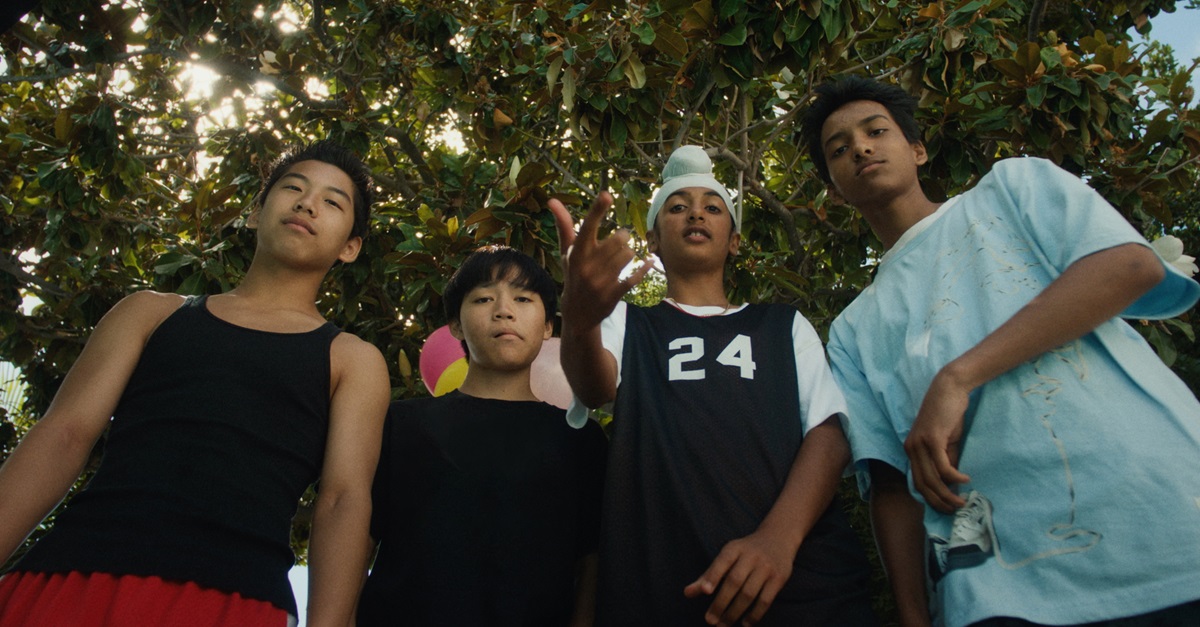
One of the big hits during the summer is "Didi," a coming-of-age film about a 13-year-old Taiwanese American boy growing up in the Bay Area.
Starring Izaac Wang ("Good Boys," "Raya and the Last Dragon") as Chris Wang and Joan Chen ("The Last Emperor," "Twin Peaks") as Chungsing Wang, the comedy-drama is the feature-length directorial debut of 29-year-old Sean Wang. Sean did the documentary short "Nai Nai & Wai Po," which won both the Grand Jury Award and the Audience Award at South by Southwest in 2023.
"Didi" also stars Shirley Chen as Vivian Wang and Chang Li Hua as Nai Nai.
We were able to interview director Sean, Izaac, and Joan Chen in a virtual press conference and we also got to talk to executive producer Chris Quintos Cathcart in an exclusive virtual interview.
Sean Wang (Director)
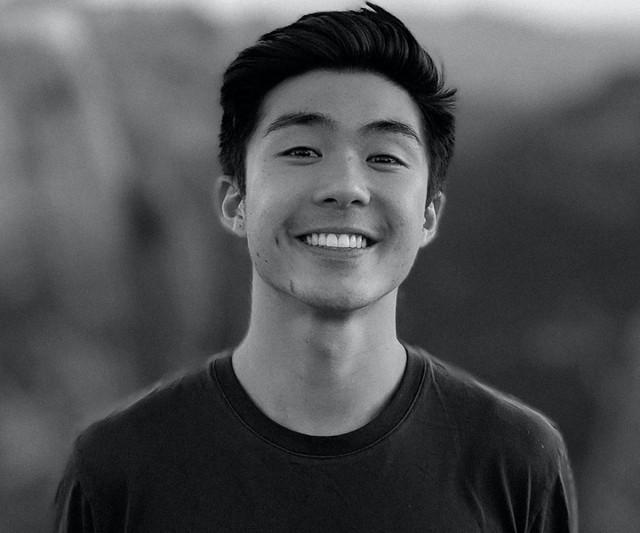
I've always been drawn to stories and movies about youth. There's just a time in all of our lives for anyone who's been like a teenager. It's this time that's so formative and turbulent, and small things feel big and big things are big.
I've always been drawn to movies like, "Stand By Me" and "400 Blows," "Ratcatcher," and even "Waterlilies." I've always just been drawn to those types of stories when I kind of grew into my own as a filmmaker and thought about the stories I wanted to tell.
I thought all of those stories that I love about adolescents and childhood that didn't pander to kids, I never saw the version that starred a kid who looked like me or Izaac, you know that version of boyhood. Looking back on my childhood, when I entered my 20s, it felt like there was stuff that was specific to mine that could hopefully again take you on that roller coaster ride of a great coming-of-age movie. But to have it be seen through our perspective.
As I started writing it, this was like 2017, and in the subsequent years, "Ladybird" came out, or maybe "Ladybird" already came out. But "Ladybird" came out, "Eighth Grade" came out, "Mid-90s" came out, "Edge of Seventeen" came out, Moonlight came out like all these now seminal contemporary classics of what you would consider coming-of-age genre, and all of their posters are just the protagonist's face, huge.
It struck me. I was like, oh, literally the movie that I'm setting up to make there's an audience for it. People clearly want this type of movie. That movie poster has Izaac's face on it, an Asian, American 13-year-old. As a fan of these types of movies, I can't think of that poster. I can't think of that movie. So, it just felt like, okay, here's an incredible opportunity to try and do something fresh and new.
You had movies like "The Farewell" come out, and "Crazy Rich Asians," which seemed like your timing, was all the more auspicious. Or you know, people want to see more stories about people who are not your typical white protagonist.
Yeah, for sure. That whole crest of what we now call this wave of New Asian American cinema. The seeds of this were planted before that, and there was a moment, too, when it was like "Master of None," and I had made a short that was my first personal one, and it was all in Chinese, so I was just starting to look inward a little bit more while the culture was starting to open up to what my personal stories just happened to be. It all aligned.
So, has your mom seen the movie? What's her reaction?
It's been lovely across the board. My mom has been pretty involved.
Part of the writing process was allowing my mom to give notes, give suggestions, and give thoughts on the character in the script. She's a painter and she's an artist, that part of the script is pretty true, and she made the character richer because I could do the empathy exercise of putting myself in someone like her shoes. But when she read the script, she was like, well, there are some things that would make the character much more I was a little bit more guarded to that.
She read the script. She has an associate producer credit for the movie. She was helpful in her production. She was on set every day just to hang out. It was really special. She saw the movie for the first time at Sundance. She hadn't seen any dailies, or rough cuts, but she watched the movie, and she loved it. There's a dedication to her at the very end of the credits. She didn't expect that. She was very moved.
Would you describe your feature debut as autofiction? Is that a form you'd like to explore going forward?
I've never heard of that term before. I like that. I'd love to keep exploring it. In some way, shape or form, every movie is autofiction. You're putting some part of yourself whether it's a period piece from the 1940s or a Space Odyssey. Hopefully, you can find your way in and tie it back to something autobiographical or personal, even if it's not super one-to-one.
Can you tell us about the journey of this film which started as a short?
Going back to my love of movies, like "Stand By Me," movies about youth. I tried to make a version of this movie back in 2014. I remember wanting to make a movie inspired by my childhood, and I just didn't have the confidence to diversify my stories at the time, because I was young, and I wanted my work to be seen.
It felt like, Okay, well, if I cast people who look like me, I don't think anyone's going to watch it because the culture wasn't reflective of that. So, it was this internal identity struggle as a filmmaker. I was 19. I didn't have that confidence. Then in 2017 again, I made a short film called "3000 Miles," and it's chronicled by my mom's voicemails, and she speaks to me entirely in Chinese. It was the first thing I did that opened any doors for me.
I didn't submit it to any festivals. It was a five-minute short film, but it was personal, small and bespoke. I did it for me, and it did everything I wanted an actual short film to make. That inspired me to look inward.
I'm now confident enough to put that on screen. Going back to this idea of making a movie like "Stand By Me," but having it star kids who looked, talked and felt like my friends and set it in a place that I know, which was East Bay, California. It was a very patient, slow process from there, writing for just writing for five years on and off before even considering trying to get it made. Then we started trying to get it made in 2022, shot in 2023, premiere in 2024 and out in four days.
You had the opportunity to workshop "Didi" at the Sundance Labs when living with these characters for so long. What was it like to reappraise them and then refine their DNAs by adding or subtracting elements?
By the time I did the Sundance Directors' Lab, I had already been working with Izaac for months. We did a lot of callbacks, and I was confident that Izaac's the one. But we had this opportunity to go to the Directors' Lab, and it was there that we just got to film two of the most challenging scenes in the movie and put them up on their feet.
It was essentially rehearsal time. It was a week of vulnerable, deep collaboration with both Izaac and Shirley (Chen), who plays Vivian Wang. Seeing the movie come alive at that moment even though we were shooting in the woods, it was like truly make-believe. Just seeing Izaac on camera and seeing the way that he carried himself. Because, you know, we're asking a lot of him to be a 14/15-year-old, to be in every scene of a movie and carry this big responsibility on his back.
It was that moment where I was like, oh, this is going to work, not just creatively, but emotionally, the responsibility that we're asking of him. It's hard for me as a 29-year-old to handle all of that, so he had maturity and immaturity, prowess. I don't know if that's the right word, but it was just okay, this is magic, and it's going to work well.
Joan Chen (Chungsing Wang)
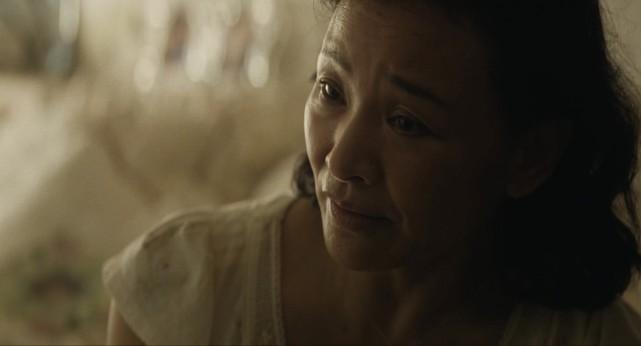
I hadn't encountered a good part like that for a while. I wasn't working in the United States for quite a long time. When parts dried off in a way, I went back to China to work, and so when Sean gave me the script I was thrilled. I was impressed by how well written that script is, a great coming-of-age story as well wrapped in it, a love letter to his mom.
Even though she is a supporting character, she has many facets, and it's quite complete and complex. Different from a lot of movies like "Crazy, Rich Asians," that matriarch that is strict and stern, and "Joy Luck Club."
This is very genuine, gentle and full of warmth. She is also an artist, and she has a sense of humor, even though she is not well adjusted to American culture, and she's confused about how to best love her son.
The back and forth between the siblings at the dinner table takes on a life of its own. But I would think that would be super challenging to direct the crosstalk and capture that energy, without it feeling forced, or without it feeling also like chaotic, or capturing the chaos but not making it understandable. That had to be super challenging.
It was maybe a fake fear, because we started filming, and it just felt alive. Seeing them take it and you learn certain things about certain actors. With both, Izaac and Shirley carried over into the movie. I was like, oh, they have, like, they both do, like little glances, right? Like tiny, little glances say a lot in that scene. You know, it was almost like the things they do between all the dialog that kind of made that scene shine.
And then the farting scene I remember, it's deceptively simple, but I was like this scene totally, it needs to always have an undercurrent of sadness. The slapstick of the fart can never outshine the undercurrent of sadness that needs to be throughout because it's like the scene where Chris's character is like, what, there's nothing more uncool than needing your mom.
He calls his mom to come pick him up, and then it's like, he's in his angst, and he's just like, I don't like, stop. I don't need you. Like, let me be sad. And then she farts and he's like, trying not to make it funny, but it is funny. So that was kind of a calibration.
What we learned at the lab was playing the more subtle version of the scene was the funniest, because there were versions of it where Izaac was, like, me out of the car. It just, needs to always have an undercurrent of sadness, as it gets really like it the slapstick of the fart can never outshine, the undercurrent of sadness that needs to be throughout because it's like the scene where Chris's character is like, what, there's nothing more uncool than needing your mom.
There were versions of it where Izaac was, like, let me out of the car. It was just really funny because we were rehearsing the scene, and he goes, oh, it smells so bad. Oh, smells so bad. Let me get out of the car. Let me out it smells so bad. Oh s---, my nose is bleeding. My nose again. This is like a really good improv, really funny.
Talk about the dinner scene where you have a mother-in-law who is telling you that you cannot control your children, and you are caught between a rock and a hard place. What was that scene like for you?
It was just one scene, one first scene. It introduced exactly where she is in her life, and I didn't have to do a lot, just to take it all in and just try so hard to control it.
You've spent a couple of hours making a good dinner, and no one was eating. I love that scene. Just one scene. It introduced the entire family.
I've had times like this. I raised two daughters who also would fight at the table, and you feel so underappreciated sometimes, because children take it for granted when you're taking care of it is what you should be doing anyway. If you make any mistakes, then they remember the mistakes. So, for me, that chaos, that confusion, is something I'm familiar with.
Also, I am an immigrant mother. I raised two American children, and exactly like what's in the script, our professions are different, or personalities are different, but the emotional truth, the core of the emotional truth is something that resonates with me very much. So, it just felt natural.
Another scene I love is when Chris brings his skateboarding friends home to look at videos and they have noticed your artwork. You're standing in the doorway awkwardly, like, oh, hi kids. Then they ask about it, and there's a look on your face. You just light up because people are appreciating your artwork. I thought that was such a moving scene. It was very subtle, but it spoke volumes.
I'm so glad you noticed that. It is a moment that I wanted to catch the "finally, someone sees her, someone sees her talent," and it's completely buried unseen just around her immediate family. That's why the last scene in the film, when Izaac and I were just looking at each other, was so moving to me that, you know he's still my little boy, and he sees me, he knows I love him. Sean did a great script. He really did.
I love your Zen-like approach to your character and response to the aggressiveness of your son. Was this acting direction coming from you, or did it come from Sean? Or were you spontaneously reacting to the scene that you were in?
Very good question. After I received the script and read the script, and now we know we're going to work together, the first thing I did was that I was very curious about Sean's mom.
The relationship is based on Sean and Sean's mom. I asked Sean if his mother could repeat the lines for me entirely. I wanted to have this exercise to see if I could incorporate another personality, another approach to this character, and after I heard it wouldn't have been the way, I instinctively set those lines. Some of these things gave me a sense of her calmness, her forbearance and patience. That was something that informed me to play a character that's probably slightly different from me being a mother to my children.
After we started shooting, Sean's mom was on set every day. We talked a great deal when we exchanged about our kids, and how they grew up. She shared with me the pieces of articles that she wrote in the newspaper about bringing up Sean, so that was an important part of what this person now sees on the screen. It was an interesting fun exercise to try to channel her spirit and her mannerisms into the part.
Izaac Wang (Chris Wang)
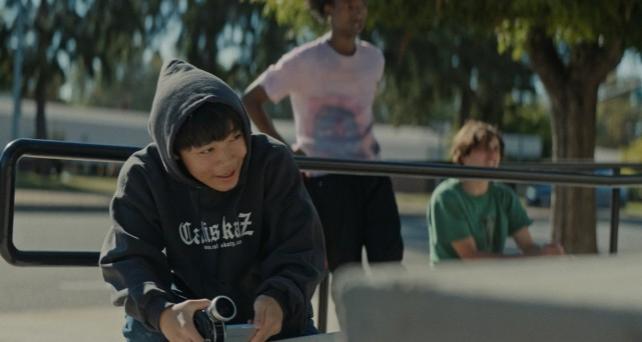
This specifically wasn't something that I was searching for. This was something that got sent to me, and then it was sent to me by my manager. After that, a whole audition process, and all the callbacks, and I managed to get the role.
My origin of acting started when I was eight years old. I've been in a few things, and they've mostly been supporting roles. They haven't been out there, and they haven't been as big as "Didi" has been because this is my first lead role in a feature film. It's pretty cool.
Did making this film give you a different look at your relationship with your mom?
For sure, this film changed a lot between my and my mother's relationship. Before, we would always be butting heads a lot and be super stubborn towards each other. We weren't getting along at the time. But now, after this movie, and after basically, like bonding for a month, because we were both living in Fremont, just like us two, it was like we had this connection throughout the movie that the movie helped with. We became a lot more chill with each other. I love that.
What were the most challenging scenes for you?
It was the original first dinner scene, as well as the fart scene in the car with me and Joan.
We learned a lot, especially with that family dinner scene in the opening. It needed to be the scene that established every family dynamic, the relationship between mom and sis and daughter and son and grandmother. I wanted it to be this scene that starts from this very domestic, quotidian family dinner that just escalates into complete chaos and cacophony, and everyone talking above and over and past one another. But it has to, again, set up every family relationship without feeling expositional.
So that was always a calibration. I had never shot a family dinner scene before, and they're just complicated. There are so many eyelines and angles, and it's just, like, deceptively complicated. That one just gave me a lot of nerves, because I'm like, okay, this is the opening scene of the movie. The first real scene. It needs to work. So that one was just scary for me.
Chris Quintos Cathcart (Executive Producer)
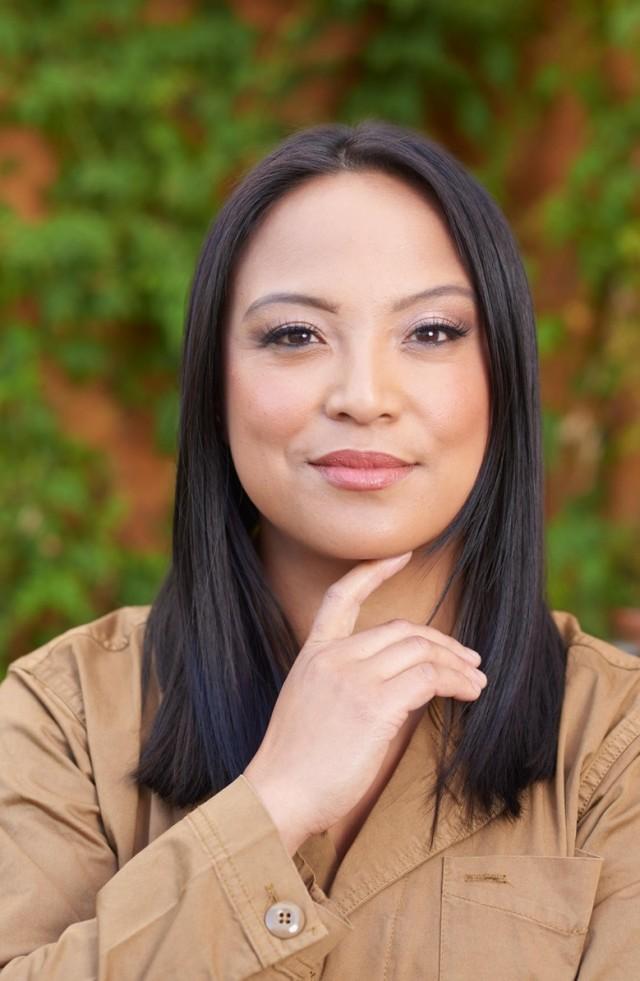
Congratulations on producing one of the best coming-of-age movies this summer, "Didi." Can you please let us know what about this movie inspired you to produce it?
I'm from the Bay Area and when we read it on the page it resonated with me. I had never seen a coming-of-age story that mirrored parts of my own growing up in the Bay Area.
Growing up as a child of immigrants, the most important part is probably that Chris, the character, wasn't an excellent Asian kid. He's just a normal teen. I feel like that, for me when I was growing up, it was a big thing. Not that I was a bad student, just that there were all these expectations that I was a math whiz, or I was going to go to med school, and I'm just not that person. So, it was refreshing and so relatable to me on the page.
What challenges did you encounter in the making of this film?
I'm not the boots-on-the-ground producer. As an executive producer, the challenge is in the picking, and the negotiations afterward. And in between, I already picked, I already made that choice about trusting this team implicitly.
I fell in love with Sean and (producer) Carlos (Lopez Estrada) pretty much immediately and knew that we were in good hands there. It was just about facing the indie landscape, the acquisitions landscape, knowing I didn't have numbers to back me up. I know as an Asian person that Asian people are starving for movies. There was a Kinsey Report that was released but outside of my knowledge, I didn't have the numbers to back me up that this would be a smart investment.
It was a gamble according to the industry, star power. But to me, Joan Chen is iconic. I kept hearing you don't have any stars in your film, and I was like, 'We have one of the biggest stars that we could have in our film.' So, we weren't even talking the same language. I would say that's probably one of the biggest hurdles that I have faced.
How was it working with director Sean Wang?
We read the script, absolutely loved it, and knew there was something special to it. We met Carlos Estrada, the producer, first and then we met Sean.
Having been an actor, there's something I'm looking for in a director; that is someone who's completely in charge, but at the same time open to collaboration. I feel that Sean has that in spades. He takes charge of the room. He's incredibly confident. He has brilliant ideas.
At the same time, he's approachable, very funny, and a good friend. Both of us having grown up in the Bay Area, we had a lot in common. We hit it off, I knew exactly what he was talking about, and I knew that he had a vision. Then, after that chat, he was telling us all the ideas, telling the story of the internet in this way, and in a way that we hadn't seen before. I just knew that he was exceptional.
Then I watched his short, "Nai Nai & Wài Pó," probably on the heels of that meeting. It blew me away. I hadn't seen the everyday home life elevated. It made it so special. Fremont, California looks like the Capri, it's beautifully lit. It's a beautiful space and the story was so touching. It felt like I could think about my Lola's living together.
The multi-generational household is just a given and that's something that I can understand. My mom lives with us, she takes care of the kids, and they have a special relationship. It was incredibly relatable, but also so beautifully done and with such care.
You can see respect for your elders. I don't have to explain it to you or anything like that. You just know, it's in our culture. Sean had the same thing; you could see that. It came across in the film in this delightful and playful way. After watching "Nai Nai & Wài Pó," I was like, yeah, I don't have to think about this. This is a given. Slam dunk.
You are also an actress and a writer. What made you go into film production?
First of all, I was an actress, and I came up in the San Francisco indie theater scene. There were no parts for me. I started writing. The only thing I could do was Shakespeare because they were the only people who cast in a quote-unquote colorblind way. But otherwise, it was all roles for white girls.
So, I started writing, but that's its own thing. It takes so much of your creative soul to do that, which I was happy to do until I had children. When I had two children it was really when it tipped the scales into, I got to do something less powerless. I need to make decisions. I can't sit around, and I can't wait for them to pick me. So that's when I started to find films to invest in, after I had my second kid.
Do you think Hollywood is changing already about getting representation in movies and TV shows?
I hope so. I think "Didi" is a test case. I think a lot of us, me included, are watching to see. I think there's a face value representation that we've done, where we just do like, well, the best friend is no longer white too, right?
It's like the lead girl's white, but then her best friend could be any ethnicity. Which is not getting to the heart of what we're talking about here. If we're always telling stories about "Romeo and Juliet," why do they have to both be white all the time? Why can't Juliet be a woman of color? And that's what I think "Didi" is. It's a coming-of-age film, but at the center of it is a person of color. What that brings is all these nuances and all these cultural experiences that a lot of people haven't seen or recognized immediately. That's what makes it so fresh. So, we're trending in the right way, but we're not quite there.
Can you please tell us more about your Filipino roots? Where are your parents from, where were you born, when was the last time you went to the Philippines, when do you plan to go back, etc.? You mentioned your mom is living with you.
I grew up in South San Francisco in the Bay Area. Church every Sunday is probably the only place I ever saw 200 Filipino people at one time. I went to Serramonte Mall all the time which is making its rounds online as the most Filipino mall in America. I ate rice three meals a day. But it took me leaving my house and going to college to value, or even define, what being Filipino meant.
It's like you are taken out of that and have such great appreciation for it. It's a family-based culture. So, my dad's not in the picture, but my mom is one of ten kids and all ten of the siblings live in Oceanside, California, which is where I was born.
My uncle is a nuclear engineer, and he got a job at San Onofre, at the nuclear plant. My aunt is a nurse and that's why we ended up in Oceanside, California. And that's where I was born. That's where my grandparents are buried. And that's the home base, I would say, for me and my family, the Quintos clan.
I have 24 first cousins on that side. I live in LA, and three people live in the Bay Area, but everyone else is in Orange County. We get together all the time. Christmas is like 100 people, lechon at my house. It's insane. I grew up very Filipino, but I've only ever been to the Philippines once. I was supposed to go. We were trying to plan a family trip for New Year's 2021, but then of course, the pandemic happened. So, I have to re-plan that at some point. But yeah, I would say just very Filipino.
And your parents are from what province, do you know?
They're both from Quezon City. They met at MIT, Mapua Institute of Technology, the other MIT.
If you had a dream project, what would it be?
I would love to find a Filipino-American rom-com. Something that highlights a great Filipino wedding would be awesome. I'd love to have that money dance in there. Maybe some tinikling at the reception, just a great rom-com. I think I would love to find that.
What advice would you give to Filipino filmmakers to be able to make it in Hollywood and get awards?
It's a good question. I think filmmakers and any creative, I think that's the biggest thing. Don't explain your culture. You don't have to, don't apologize for it. I don't need to know what every single dish is or why you do mano, just do it. And trust that in your specificity.
The more specific you get, the more universal it turns out to be, ironically. "Didi" is hyper-specific. It's Bay Area 2008, very specific. And because it's so specific, everyone gets it. He's painted like the clearest picture and sometimes I think I've read a lot of scripts where there's just, you don't need to teach us about your culture because it almost feels like an apology. Just do it. Love it.
So, what's next for you?
We have our first documentary project coming up. That is about a man named Benny the Jet Urquidez who was a professional kickboxer and then he transitioned into fight choreography for films. He was the big guy who trained everyone. So much so that Keanu Reeves is executive producing, and Fisher Stevens is producing.
Keanu Reeves is doing it because he idolizes the man. Who would know fight choreography better than Keanu Reeves? It's directed by a woman named Jennifer Tiexiera. And then, of course, Benny, our subject, is half Native American. His wife is also a fixture in the Native American community. They're like leaders. And it's a little bit of a love story in a sports doc.
—MGP, GMA Integrated News




